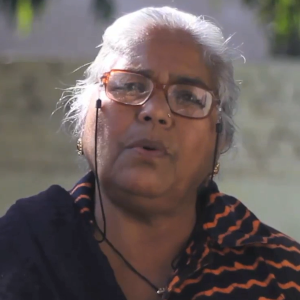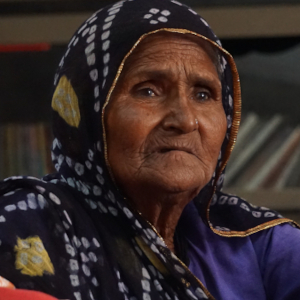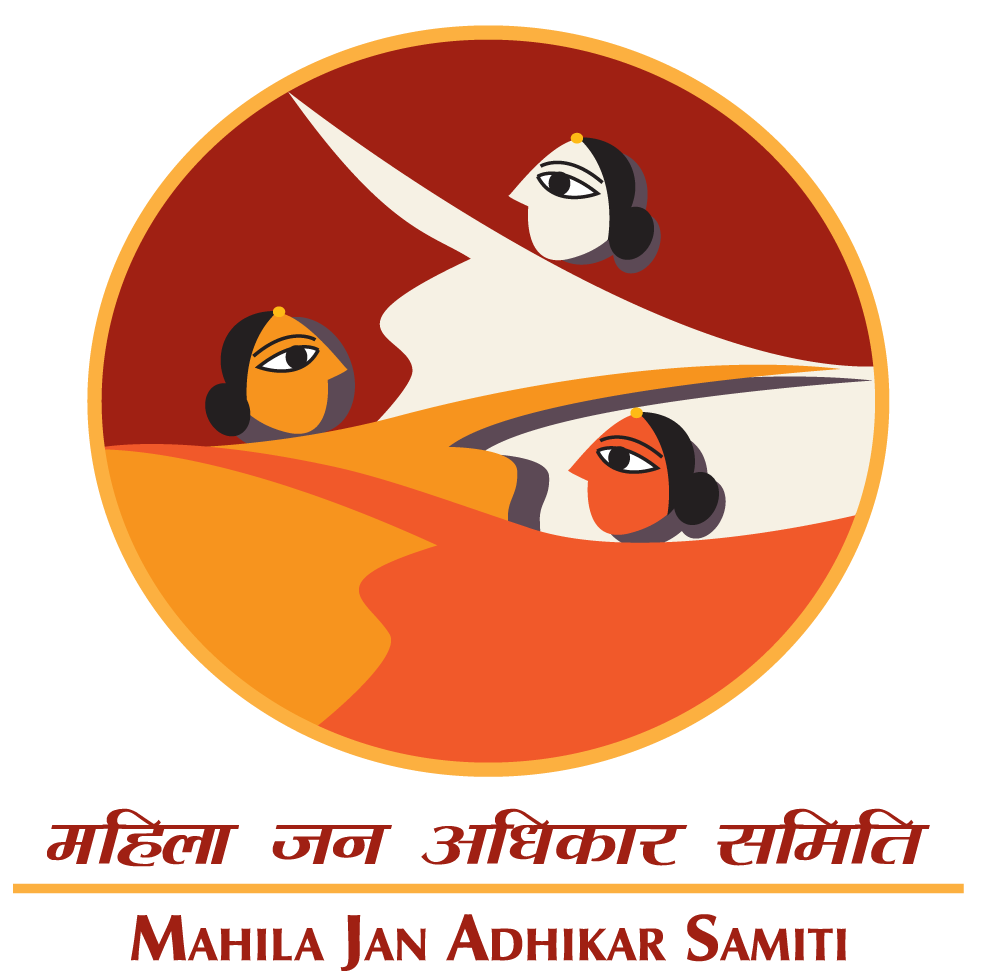The Success Story of
Founding Members’ Testimonials


The founding members of MJAS are women who have faced discrimination of the cruellest forms and yet found the courage to not only fight injustice, but in their struggle, have inspired many others to follow in their footsteps. Here are the stories of two of the earliest members of the organisation.
Bhanwari Bai
Right from the beginning, I have been working for the rights of the marginalised communities. In 1984, we celebrated Ambedkar Jayanti and invited women who were linked to the Adult Education Society and Ambedkar Samiti in Ajmer. We discussed various social and economic inequalities prevailing in society and took a collective decision to approach the police and the legal system to demand justice for the Dalits and other marginalised groups. Many opponents, who were curious to know what was happening at the meeting, began stoning us and tore the tent where we had gathered. They realised I was leading the meeting and decided to teach me a lesson. A few days after this incident, when my daughter had gone to the fields, a boy from the Yadav community raped her. Due to the trauma that came from the incident, she lost her mental balance. A meeting of the panchs from three villages was called. I was paid Rs. 1,100/- as compensation but was excommunicated from my caste. Miserable and lost, I sold the few goats I had, locked up my house and shifted to Ajmer from my village. I spent the night on the streets which worsened my daughter’s condition. She began abusing and screaming loudly. I did not know whom to approach and then came across a group of Christian missionaries. They offered me some money to purchase food and informed me about women from the Samanvay Samiti. I approached them for help, and from then on, I made a resolution to help every woman who was a victim of violence. In the initial years, my work involved campaigning for the rights of the people displaced due to the construction of the Bisalpur Dam. This is where I learnt how to mobilise women for collective struggles. My quest for justice for women sufferers of violence continues to date. Founding member and Coordinator, MJAS
Bardi Bai
I lost my father to tuberculosis at the age of four. My mother worked as a village midwife and supported the family. I accompanied my sister to school and continued my studies until Class VII. Then, at the age of 12 my mother fixed my marriage with Chhotu Lal of the neighbouring village. He was not literate. I went to my husband’s house (after gauna) at the age of 16 but soon realised that he did not do any work and was an alcoholic. He would beat me regularly. I was not given food or allowed to interact with the neighbours or even my own family members. At the age of 18, I gave birth to a son, but the violence continued. Fed up with my circumstances, I went back to my mother’s house. I told her that I’d rather survive by begging than go back so she was compelled to keep me in her house. About a year later, I was sent into nata with Chanda Ram Bhil and my first husband was given a sum of Rs. 700 in exchange. My second husband was involved in brewing illicit liquor and would force me to have sexual relations with other men. This became a daily routine. At one point, I couldn’t take the torture anymore, and went back to stay at my mother’s house. I also began working as domestic help in the sarpanch’s house. Around this time, the IDARA functionaries in Ajmer were looking for saathins for the Women’s Development Programme. Upon hearing my story, they (Indira and other WDP functionaries) visited my village. They met me and felt that I was courageous, educated and bold and would be able to raise women’s issues. I was selected as a saathin in 1984. Initially, I was scared to take up this work but agreed to attend the first training after the sarpanch of my village spoke to me. During the training, just sitting on the same durrie as the other women was significant for me. It led to shifting my perspective on women’s rights in public spaces. Slowly, I began contacting the women in my village and forming women’s collectives. We took up issues related to violence against women including sexual violence within and outside the home, minimum wages, clean drinking water, education and health. In 1990-91, the Bisalpur Dam construction started in Tonk district. I joined the Samanvay Samiti to work for the rights of the displaced. We put up a huge struggle for their rehabilitation and compensation. We demanded that each displaced person including women and girls be allotted a plot of land in their name.
Founding member, MJAS
Right from the beginning, I have been working for the rights of the marginalised communities. In 1984, we celebrated Ambedkar Jayanti and invited women who were linked to the Adult Education Society and Ambedkar Samiti in Ajmer. We discussed various social and economic inequalities prevailing in society and took a collective decision to approach the police and the legal system to demand justice for the Dalits and other marginalised groups. Many opponents, who were curious to know what was happening at the meeting, began stoning us and tore the tent where we had gathered. They realised I was leading the meeting and decided to teach me a lesson. A few days after this incident, when my daughter had gone to the fields, a boy from the Yadav community raped her. Due to the trauma that came from the incident, she lost her mental balance. A meeting of the panchs from three villages was called. I was paid Rs. 1,100/- as compensation but was excommunicated from my caste. Miserable and lost, I sold the few goats I had, locked up my house and shifted to Ajmer from my village. I spent the night on the streets which worsened my daughter’s condition. She began abusing and screaming loudly. I did not know whom to approach and then came across a group of Christian missionaries. They offered me some money to purchase food and informed me about women from the Samanvay Samiti. I approached them for help, and from then on, I made a resolution to help every woman who was a victim of violence. In the initial years, my work involved campaigning for the rights of the people displaced due to the construction of the Bisalpur Dam. This is where I learnt how to mobilise women for collective struggles. My quest for justice for women sufferers of violence continues to date. Founding member and Coordinator, MJAS
Bardi Bai
I lost my father to tuberculosis at the age of four. My mother worked as a village midwife and supported the family. I accompanied my sister to school and continued my studies until Class VII. Then, at the age of 12 my mother fixed my marriage with Chhotu Lal of the neighbouring village. He was not literate. I went to my husband’s house (after gauna) at the age of 16 but soon realised that he did not do any work and was an alcoholic. He would beat me regularly. I was not given food or allowed to interact with the neighbours or even my own family members. At the age of 18, I gave birth to a son, but the violence continued. Fed up with my circumstances, I went back to my mother’s house. I told her that I’d rather survive by begging than go back so she was compelled to keep me in her house. About a year later, I was sent into nata with Chanda Ram Bhil and my first husband was given a sum of Rs. 700 in exchange. My second husband was involved in brewing illicit liquor and would force me to have sexual relations with other men. This became a daily routine. At one point, I couldn’t take the torture anymore, and went back to stay at my mother’s house. I also began working as domestic help in the sarpanch’s house. Around this time, the IDARA functionaries in Ajmer were looking for saathins for the Women’s Development Programme. Upon hearing my story, they (Indira and other WDP functionaries) visited my village. They met me and felt that I was courageous, educated and bold and would be able to raise women’s issues. I was selected as a saathin in 1984. Initially, I was scared to take up this work but agreed to attend the first training after the sarpanch of my village spoke to me. During the training, just sitting on the same durrie as the other women was significant for me. It led to shifting my perspective on women’s rights in public spaces. Slowly, I began contacting the women in my village and forming women’s collectives. We took up issues related to violence against women including sexual violence within and outside the home, minimum wages, clean drinking water, education and health. In 1990-91, the Bisalpur Dam construction started in Tonk district. I joined the Samanvay Samiti to work for the rights of the displaced. We put up a huge struggle for their rehabilitation and compensation. We demanded that each displaced person including women and girls be allotted a plot of land in their name.
Founding member, MJAS
